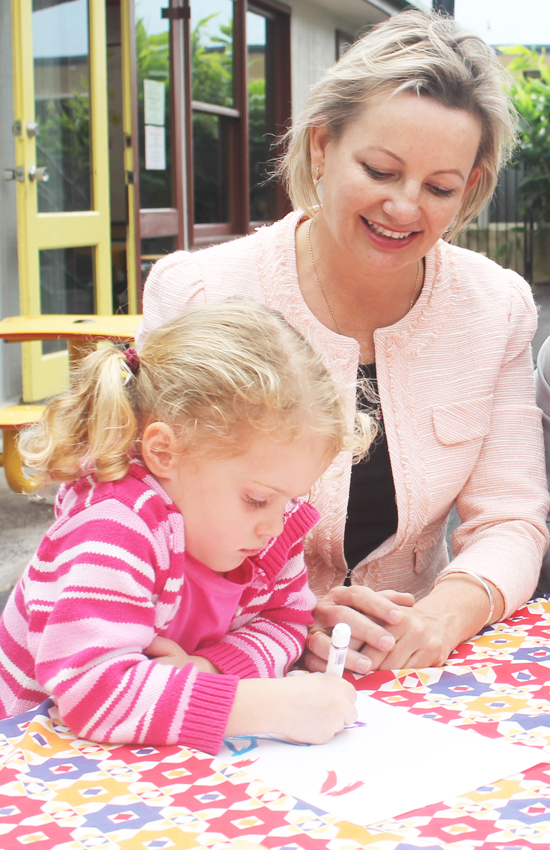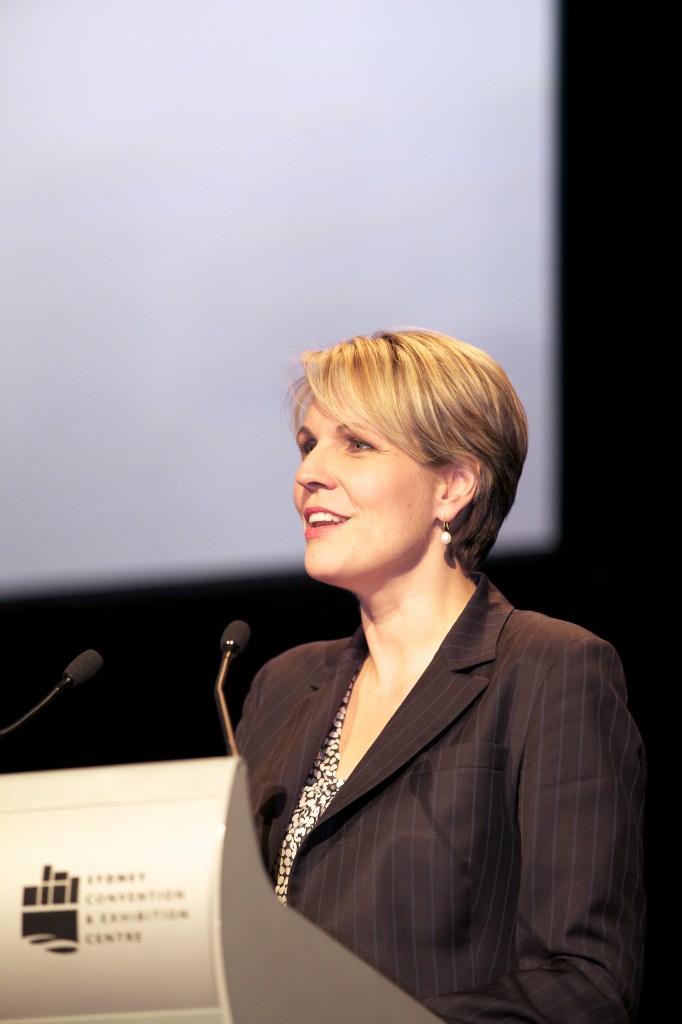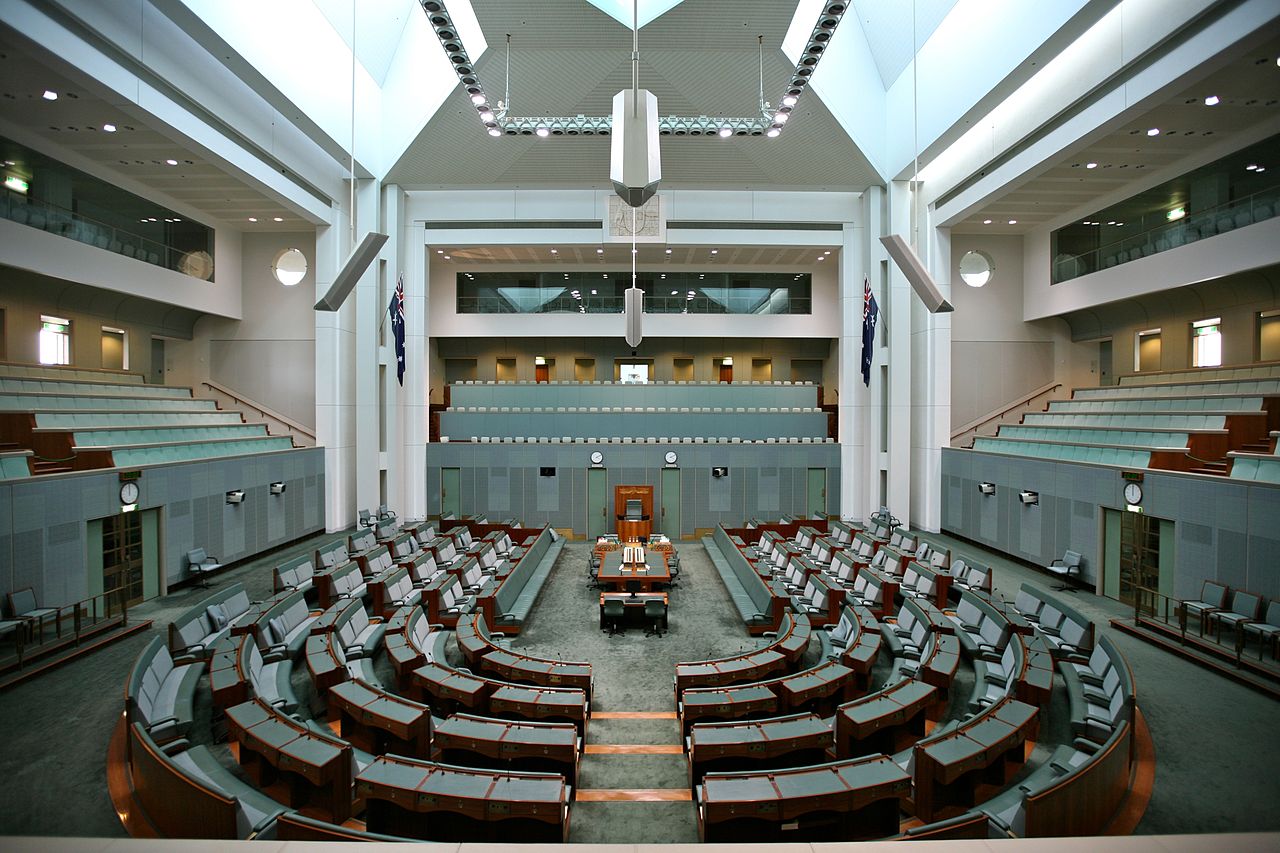Why is parliament so late to the flexible working conditions party? Steph Nash reporting.
If the life of Liberal MP, Sussan Ley, were a job advertised on Seek, the list of requirements for the position would scare many.
Job requirements:
- Farming experience necessary
- Must be able to fly planes
- Degrees in economics, taxation law and accounting preferable
- Should expect to be away from home for long periods of time
- Ability to face public criticism essential
- Needs to be able to look after three children
She and her husband, John, spent 15 years as livestock and dairy farmers in North Eastern Victoria before going their separate ways. After the birth of her first child, Ley decided to seek part-‐time study in economics. Ten years later, Ley had three degrees and three children – a feat in itself for a woman from the country.
In 2001, she made the bold switch to politics, waving good-‐bye to the farm and hello to parliamentary life.
The days of balancing part-‐time study with farming and family were over, but the days of constant travel and long hours were just beginning.
Sussan Ley assures that she tried very hard to be around for her kids, but admits that the parliamentary working conditions made that very difficult – especially as a single parent.
“At home I tried to keep things as normal as possible. If I could, I’d take the children to school, get up early to make lunches, and try to be on hand to help with homework … But in reality, I think the children would remember that I was away more than I was actually there.” Ley says.
Ley is in the minority of female parliamentarians who were with young children at the time they entered politics. She is also one of the few women in the current federal ministry.
Keeping in mind that the number of women in Australian executive roles is frighteningly low, one is compelled to question whether these two facts are related.
Are the demands of motherhood keeping women away from politics?
The government is currently pushing for flexible working conditions in the private sector, which aims to provide parents and carers with better job security. The Workplace Gender Equality Agency (WGEA), a government-‐owned authority, lists ‘flexible working arrangements’ as one of the key indicators for gender equality.
But ‘monkey see’ may not necessarily mean ‘monkey do’.
Parliamentary life appears hard for both mothers and fathers, with the current so-‐called ‘flexible’ working conditions providing little to no opportunity for parents to make time for their children.
Whilst the issue of travel will ultimately be of strong concern for any working parent, the assumption still exists that the high rate of pay for parliamentarians should be enough for them to seek external child support.
Whilst there is a childcare centre at Parliament House, Labor Senator, Claire Moore, says that this is not always ideal for parliamentary employees. She stresses that the life of any employee in an executive position comes with huge responsibilities, and that families should discuss their options before one or both take up a career as demanding as politics.
“I think on the element of caring and family responsibilities, this job is not one that is particularly good for that,” she says.
“If you want to be in this job, it has to be a family decision. Your family needs to be involved in this decision because it has a couple of specific elements. One is the time away from home. The other is the seven-‐days per week nature of the job. You don’t only work when you’re in Canberra. If you’re going to be a successful parliamentarian, you need to be out in your electorate. So you don’t have clearly defined on and off hours.”
These ideas of time and travel may not only provide us with an explanation for the lack of mothers in parliament, but it might also give us an answer as to why there are less women in executive roles.
Former Liberal senator, Sue Boyce, argues that parental leave could place women at a career disadvantage. Whilst the career status of a parliamentarian is particularly hard to maintain, completing enough work to qualify for an executive position is even harder.
“One of the issues that certainly comes up is that some of the younger guys in the party deliberately position themselves from perhaps their mid-‐20s as to how they are going to become a politician maybe 10-‐12 years down the track.” Boyce says.
“I don’t see that same sort of positioning going on from women. I’ve seen a couple of women who were keen to do it that way, but they were seen as overly ambitious or pushy.”
Australian culture has inevitably evolved from its patriarchal history. Before the Public Service Act was amended in 1966, women were forced to resign once they were married.
“You’re still expected to be in Canberra for great slabs of time -‐ away on committee meetings and committee inquires for great slabs of time. And we’ve done very little to try and make it more attractive for people with families.” – Sue Boyce
These days, it is not uncommon for women to work full-‐ or part-‐time. But it seems that the expectation of the mother to be the primary carer of her children is yet to escape the Australian psyche.
According to the Australian Bureau of Statistics (ABS), fifteen per cent of families with children under the age of 15 have a full-‐time working mother and a part-‐time working or unemployed father.
Compare this to families of the same demographic with a full-‐time working father, which is 76 per cent.
Executive chair of Women on Boards, Ruth Medd, complains that there are not enough workplaces in Australia that challenge this gender pre-‐conception. She says that although policies exist to facilitate employees with young children, these policies don’t do enough to target men as well as women.
“It is clearly hard for women to succeed in corporate Australia, in the public sector, or in academia, and one of the clear reasons for that is that the systems of assessment set up are still on the basis of working full-‐time for 35 years.” Medd says.
“People say, “Mary isn’t committed to her job because she has to leave on Fridays at three to puck up Sally-‐Anne and James”, whereas we all know that the dads go off to the school sports day and no-‐one blinks an eye-‐lid, generally speaking. And fathers have children too – is that a problem for their working career? No, not at all. But it’s a problem in some circumstances for women’s working careers.”
For parliament specifically, it’s a job in which time and effort are compounded – and it’s been that way since federation.
Although working conditions for parliamentarians have improved over time, many things have stayed the same, which Sue Boyce argues is a fundamental reason why there is a lack of young mothers in the Lower House.
The solution?
Re-‐evaluate the way parliament operates, and make the conditions suitable for working parents.
“If you’re on the local council, you could probably get home in time to check the homework, or cook dinner, or whatever it is you have to do. Which brings us back to the way we go about parliament – which is pretty much the same way we went about parliament in 1901,” Boyce says.
“You’re still expected to be in Canberra for great slabs of time -‐ away on committee meetings and committee inquires for great slabs of time. And we’ve done very little to try and make it more attractive for people with families.”
If you look closely at the number of successful Liberal women, most of the contenders are either without children or in middle age. Julie Bishop, Michaelia Cash, Marise Payne and Concetta Fierravanti-‐Wells are all without children. Both Judith Troeth and Sue Boyce had adult children when they were first elected to the Senate.
Clearly there seems to be an issue with raising young children and parliamentary success.
Helen Conway, CEO of the WGEA, says that the various cultural assumptions surrounding women are to blame for the minimalist presence of women in executive positions – both in politics and in the corporate world. She advises that organisations change their structures to challenge these stereotypes, so to cash in on the profits of workplace diversity.
“Fundamentally, given that it’s unfortunately the case that women do most of the caring, we really need to have a lot more flexibility around our workplaces to facilitate women engaging in those workplaces,” Conway says.
“I think it’s all about making workplaces more attractive for women, and of course, the pay off for whoever it is – whether it’s the WGEA, whether it’s Parliament House, whether it’s a corporate company in Melbourne – is that you get much better talent. You get much better productivity, and diversity brings better performance.”
Deputy Leader of the Opposition, Tanya Plibersek, has three children under the age of 15. Her youngest son, Louis, is only five years old.
When Louis was a baby, Plibersek worked almost part-‐time, working some days on, some days off. Most days, she took Louis to work with her.
When she was needed for question time, she had her mother to turn to for support, who would sit patiently in Plibersek’s private office and nurse the baby.
That was a busy time for Tanya Plibersek, but now that all three of her children are in school, she says it’s a bit easier. Although her children are first and foremost her top priority, she says she is too passionate about politics to ever consider leaving, and is willing to face the challenge of balancing parliamentary leadership with parenthood.
“I have never considered for a moment making a choice between having a career and having a family. Both are really important to me. It’s sometimes difficult to balance the two, but I couldn’t give up either.” Plibersek says.
“My husband and I accept all the help we can get from our mothers, other family and friends. I also cook in large batches and freeze left-‐overs.”
As of 2013, Sussan Ley was appointed Assistant Minister for Education, with her portfolio covering childcare and early childhood education. She says that her laboring experience as a politician and a parent has made her well aware of the issues facing full-‐time working parents. With this in mind, she hopes to make childcare more available to Australian parents, so that less have to face the same struggle that she did.
“If you are the main income earner and you have a supportive partner who can assist at home that’s fantastic. If not, you need supportive family, and paid support in the form of childcare,” she says.
“I meet a lot of women who spend a large proportion of their after-‐tax dollars on their au pair, nanny, out of school care or vacation care… It points to a bit of a crisis when it comes to the participation of these women in the workforce today.”
If the government, in the guise of the WGEA, thinks that private companies need to make the working conditions for parents easier, why is it that they aren’t leading by example?
They say what’s good for the goose is good for the gander – and it seems that the Prime Minister, Tony Abbott, and his flock are showing the people a bit of a double standard when it comes to flexible working conditions.
Does the role of a parliamentarian really need to be a full-‐time job?
For women, perhaps the change we need to see is cultural, with Plibersek suggesting that strong family support and a pro-‐childcare attitude is a must for mothers in parliament.
“Being a Member of Parliament is a wonderful responsibility, and a great opportunity to give something back to your community, but it’s pretty hard on family life,” she says.
“There’s a large amount of travelling, a heavy workload and a hectic schedule. I think quality and affordable childcare is important to make sure women are participating fully in any career, including parliament. Anyone considering combining a career in politics and a family has to have a very understanding partner or other support.”













